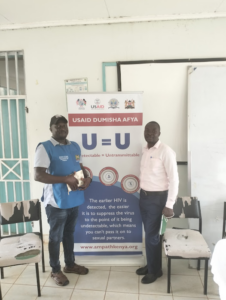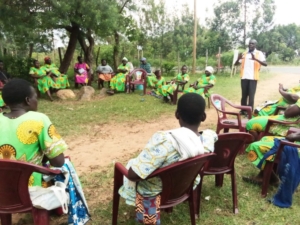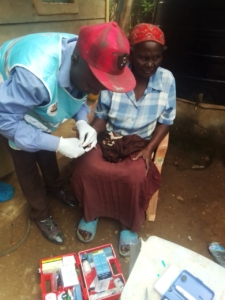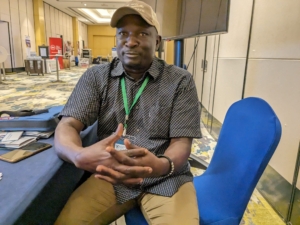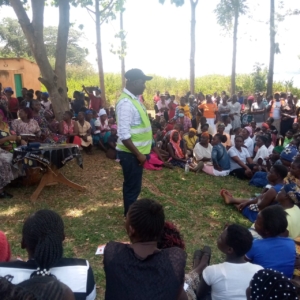John Wabwire has nearly twenty years of experience as a community health worker. “I joined the community health unit in 2006,” he recalls. “I am a survivor of HIV and tuberculosis, and I was motivated to help other survivors learn they can live and even grow old with these illnesses if they get the care they need.”
Over the past two decades, John has provided preventive, curative, and referral services to his patients in Busia County, Kenya—a country where Africa Frontline First works alongside governments to unlock additional funding to strengthen community health systems. “I look out for my neighbors and how they are doing,” John says. “If they say, ‘My child is feeling unwell,’ I will check for malaria or other common diseases. I check on the under-five children, making sure they get their vaccines. I visit pregnant women, making sure they are healthy, and that they know to go to the hospital. I remember one husband and wife—they didn’t want to go to the hospital. They were afraid. I said, ‘Look, your baby will be born today, you must go!,’ and so they did. They named the baby John, after me.”
In remote communities, John explains, the community health workforce is a crucial source of care for patients—but they face many challenges. “Transportation, essential medicines. We need these very much to help our patients,” he says. Beyond the supplies he requires to ensure he can provide care, John is focused on an urgent need: training to equip community health workers to face health crises driven by climate change.
“In my community, in many remote communities, we are already being affected by climate change,” John states. “Primary health is connected with climate, and the climate is impacting us very much in the community. There can be flooding that leads to bad water and causes malaria or cholera.”
Community health workers receive training across an essential package of primary health topics—but even with years of experience and regular training, John feels unprepared to tackle the health and climate crisis he sees unfolding. On his own, he has sought out opportunities to develop a stronger understanding of the intersection of climate and health, but he believes all community health workers must be educated on this topic.
“We are in the position to talk to the community about climate,” says John. “We can teach them about indicators and impacts of climate change in the household. We can learn what diseases and conditions can increase with climate change, and how we can be prepared. We can look out for diseases, educate the community. We can be ready to provide care right away if we have the right knowledge and training.”
Even after many years in community health, John’s passion sustains him. “We must ensure every community can have a community health worker,” says John. “We are the ones who can reach patients who are too far away from the hospitals. We are the ones who can identify new diseases—we can be the searchers. We are the ones who can end pandemics. We are the ones who can respond to outbreaks caused by climate change. We are trusted in our communities—they see us every day. People seek us out for care, even if they don’t trust a doctor, because they know us. We must be paid, we must have supplies, we must be digitized so we can communicate when there is a new outbreak. And we must be represented—health leaders must listen to our voices, and respond to our needs! This must be done very immediately in order for us to move on and achieve universal health coverage.”
As an CHW representative on the Africa Frontline First Catalytic Fund Advisory Committee, John attended the International Conference on Primary Health Care in Addis Ababa, Ethiopia, in 2023. He used that opportunity to advocate for all community health workers to receive the salaries, skills, supplies, supervision, and digital systems they need to succeed. When he held the microphone in a room that included ministers of health, NGO representatives, academics, and other health leaders from around the world, he made an urgent call to action for equipping the community health workforce to respond to climate change.
“Change starts from the ground,” says John. “It starts in the community, it starts with us as community health workers. We must invest in community health workers. We must learn how to respond to climate change—leaders must listen to us, and integrate this into training, so we will be ready. I want to tell the whole world that this needs to be done.”

